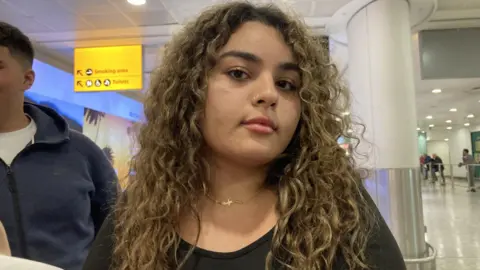
 BBC
BBC
British nationals in Lebanon have no guarantee they will be able to leave quickly if the “febrile and fragile” situation deteriorates, the foreign secretary has said.
David Lammy has urged Britons to leave the country by commercial flights or on a UK-chartered plane departing on Wednesday, warning the airport in Beirut may close if the fighting continues.
But Britons in Lebanon told the BBC they have received no confirmation or details about their booking on the government-chartered flight, despite paying for a seat.
“I have such a heavy heart and I’m so anxious – if I don’t get on that flight, there’s not really another way back for another two weeks,” said Hanan Baba, 29.
Speaking to the BBC from Tripoli, north Lebanon, Hanan said she originally planned to fly home on 5 October – before Israel hit Lebanon with a fresh wave of airstrikes and announced a “targeted” ground operation in the south.
“Ticket prices went through the roof – a budget airline that usually offers a one way trip to the UK at £250 is suddenly £800,” she said.
“There’s nothing else on offer now, apart from very few business class flights costing about £8,000. Or you can bribe someone to take you on a boat to Turkey or Cyprus – for thousands”.
On Tuesday Lammy said he was “seeking more capacity over the coming days” so that people can return to the UK, but he warned he could not promise all would be swiftly returned.
As of last week, there were thought to be between 4,000 and 6,000 UK nationals, including dependants in Lebanon.
Hanan has paid the requisite £350 for her seat back to the UK on the government-chartered flight, but has received “no communication” about the flight time or whether she has a guaranteed seat on the plane.
“I feel like the government are covering their backs, deploying troops to Cyprus and saying they are negotiating day and night with flights but we have not seen any of that. They have not even communicated a plan.
“I don’t even know which airline the plane is, or what time it’s going to leave – and I have to actually get to the airport, which is scary enough.
“There are reports of bombs and missiles landing a five minute drive from the airport”.


Other British nationals have described the “terrifying” journey to Beirut-Rafic Hariri International Airport from various locations in Lebanon.
Lara, who did not want to give her surname, 19, told the BBC she had risked her own life to fly back to the UK.
“I had to convince myself that if I die it’s ok – everyone dies at some point. I’d mentally convinced myself that it was ok to be killed by a rocket.
“Whenever I hear a bang, or whenever I hear something being dragged across the floor, I think it’s a plane or a missile coming towards me. I shouldn’t have to have that trauma – I’m 19.”
Lara, who lives in London and is in her second year of university, had been visiting family in Beirut.
She made the journey back with her 84-year-old great-grandmother who had also been on holiday in the Lebanese capital.
Lara said she’d received “zero communications, no help” from the UK government, and though she flew with a commercial airline, she said that it had been tough to find a flight that was direct – and affordable.
“The cost is atrocious,” she said.
A British man who works for an international humanitarian organisation and wishes to remain anonymous, evacuated his home in Beirut to Mount Lebanon with his wife and child last week.
They are looking for a flight out of Lebanon, but spots are booked for the next two weeks “in every which direction”, with the earliest on 16 or 17 October, and those are business class seats to Madrid or Milan costing thousands, he told the BBC.
He said he heard about the chartered flight for British citizens through news reports and has not received any information or offer from the Foreign Office to buy a seat.
BBC News told the Foreign Office about British nationals saying they had not received confirmation or communication about the charter flight.
The Foreign Office did not comment.
He added that many people are fearful and under psychological stress because “we don’t know where Israel is going to strike next”.
“Everyone outside of the Bekaa Valley and the south and the suburbs of Beirut feels that the war is going to inevitably come to their doorstep,” he said.
Lebanese Prime Minister Najib Mikati said his country is facing “one of its most dangerous phases”, and that one million people are displaced.
On Monday Israel said it had launched a ground invasion in southern Lebanon, in what it has described as “limited, localised and targeted” raids against Hezbollah.
Lebanese civilians are being warned not to use vehicles to travel south across the Litani river, located 20 miles (32km) north of the Israel-Lebanon border, and residents in around 25 villages have been told to evacuate and head north.
The previously sporadic cross-border fighting between Israel and Hezbollah escalated on 8 October 2023 – the day after the unprecedented attack on Israel by Hamas gunmen from the Gaza Strip – when Hezbollah fired at Israeli positions, in solidarity with the Palestinians.
With additional reporting from Mallory Moench, Grace Dean and UGC Hub








